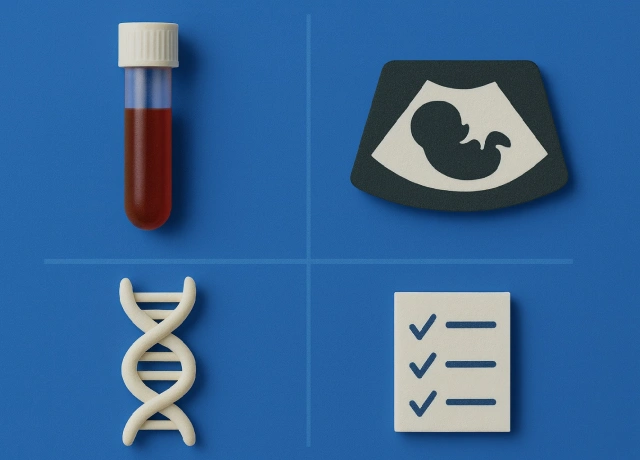Pre-Natal Testing

What is Prenatal Screening?
Early Insight for a Healthy Pregnancy
Most pregnant women can expect to have a healthy pregnancy and baby. However, it is estimated that 1 in 1000 pregnancies will have a congenital defect like Down Syndrome which affects physical development, learning, and sometimes the heart or other organs. Such genetic disorder cannot be diagnosed by ultrasound alone.
The risk increases with maternal age (about 1 in 250 for women over 35), yet most babies with Down Syndrome are born to younger mothers.
Prenatal screening is a test that offers a safe and reliable way to understand these risks early in pregnancy.
Early screening empowers parents with timely information and choices.
Types of Prenatal Screening

Double/Triple Marker Screening OR Traditional Prenatal Screening :
It involves:
- A simple Blood test – measures pregnancy-related proteins (hCG, PAPP-A).
- An Ultrasound Scan – checks markers like Nuchal Translucency (fluid at the baby’s neck).
Results are analyzed using advanced software to calculate the chance of genetic defects. If the risk is high, further confirmatory testing i.e. Prenatal Diagnostic test is offered.
Non-Invasive Prenatal Screening (NIPS)
NIPS is a simple test which used mothers blood to analyses tiny fragments of the baby’s DNA (cell-free DNA) circulating in the mother’s blood. It provides early and highly accurate screening for certain chromosomal conditions, without any risk to mother or baby.
The NIPS Test uses whole genome sequencing approach that reads thousands of genes.
Sequences to ensure comprehensive coverage with more than 99% accuracy.
What NIPS screens for:
Trisomy 21 (Down Syndrome)Trisomy 18 (Edwards Syndrome)
Trisomy 13 (Patau Syndrome)
Sex chromosome conditions such as Monosomy X (Turner Syndrome) and other aneuploidies
Selected microdeletions, such as 22q11.2 deletion syndrome
When it can be done:
From as early as 10 weeks of pregnancy, Recommended up to 22 weeks of gestation
Suitable for women across different age and risk categories
Why choose NIPS?
It is safe, non-invasive, and offers early reassurance by detecting conditions with high accuracy, helping parents make informed choices about their pregnancy.
| Feature | NIPS | Traditional Screening |
|---|---|---|
| 🧪 Test Type | Simple blood test (analyzes baby’s DNA) | Blood test + ultrasound markers |
| 📅 When Done | From 10 weeks | 11–14 weeks |
| 🎯 Accuracy | Very high (>99% for Down Syndrome) | Moderate (70–80%) |
| 🤰 Safety | No risk to mother or baby | Safe, but less accurate |
| 🧬 Conditions Screened | Trisomy 21, 18, 13, sex chromosome disorders, some microdeletions | Trisomy 21, 18, 13 |
| ✅ Next Steps | High-risk → confirm with diagnostic test | High-risk → confirm with diagnostic test |
Prenatal Diagnostics
Prenatal diagnostics tests are offered to the pregnant women with high-risk prenatal screening results, to provide accurate information about a baby’s health before birth, helping parents and doctors make informed decisions.
Why it matters
Prenatal diagnostic tests go beyond routine screening. They are designed to confirm or rule out chromosomal or genetic conditions when screening results or medical history indicate a higher risk.
Commonly Diagnosed Conditions
Chromosomal abnormalities (e.g., Down Syndrome, Edwards Syndrome, Patau Syndrome)
Genetic disorders (such as Thalassemia, Sickle Cell Disease, Cystic Fibrosis)
Structural anomalies (heart defects, neural tube defects, etc.)
Types of Prenatal Diagnostic Tests
- Chorionic Villus Sampling (CVS): Performed between 11–14 weeks, involves testing a small sample of placental tissue
- Amniocentesis: Usually done between 16–20 weeks, involves analysing a sample of amniotic fluid.
- The CVS for Amniocentesis sample is used for performing tests like Karyotyping, FISH, Qf-PCR, Chromosomal microarray, Clincal Exome and Whole Exome- Next Generation sequencing, to provide detailed insights and unequivocal results into specific inherited conditions.
Benefits for Parents
- Clear understanding of the baby’s health
- Informed choices about pregnancy management
- Early planning for specialized care if needed
Navigene Prenatal Testing Support
From screening to confirmatory testing — everything you need in one place, with expert support at every stage of testing all at one trusted center.
FMF-accredited DELFIA system with LifeCycle software
Internationally accepted precision (Fetal Medicine Foundation)
India-centric MoM values for higher accuracy in Indian population
High US-FDA approved NIPS platforms
All Confirmatory testing/ Prenatal
Diagnostic services and follow up investigation offered under one roof
Remote telegenetic counseling (phone or video) for screen-positive results
Clear explanation of test reports
Review of family history & genetic risks
Guidance on next testing options
A summary report sent to your doctor
Complete screening & follow-up diagnostics under one roof
Expert review of all screen-positive cases
Suggested investigations included in reports
Convenient services:
- Anytime sample pick-up & report delivery
- Online registration & payment





